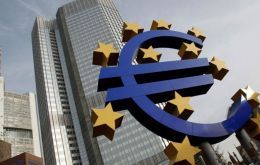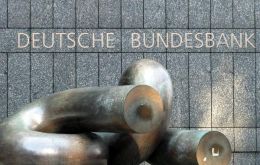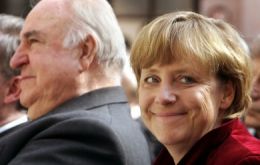MercoPress. South Atlantic News Agency
Tag: ECB
-
Thursday, October 31st 2019 - 08:51 UTC
New ECB chief calls on budget surplus countries to spend more and help prop growth

Incoming European Central Bank chief Christine Lagarde on Wednesday took aim at Germany and other thrifty Eurozone members running budgetary surpluses, saying they should increase their spending to shore up slowing growth.
-
Friday, December 14th 2018 - 09:03 UTC
ECB confirms it's ending the massive bond-buying scheme

The European Central Bank has confirmed it is ending its huge net asset purchase program to stimulate the Eurozone economy this month. The ECB has stopped its bond-buying scheme, worth €30bn a month, despite a recent slowdown in the bloc's recovery.
-
Friday, September 14th 2018 - 08:37 UTC
BoE and European central bank keep rates unchanged; Turkey hikes 625 points to 24%

Stocks in Europe reversed earlier gains by Thursday's close to finish lower, as investors digested fresh news out of the central banking sphere. The pan-European STOXX 600 closed down 0.15%, with the majority of sectors falling into negative territory. The U.K.'s FTSE 100 slipped 0.43% by the close, while France's CAC 40 ended a touch lower, off 0.08%, and Germany's DAX rose 0.19%.
-
Monday, September 24th 2012 - 19:56 UTC
German fears of recession as business climate index drops for fifth month running

German business sentiment dropped for a fifth straight month in September to its lowest since early 2010, raising fears of recession and underlining that a bold bond-buying plan laid out by the European Central Bank is no economic blessing.
-
Thursday, September 20th 2012 - 23:34 UTC
Merkel honours her mentor and Euro architect, Kohl to help discipline the party

Angela Merkel is seeking help from her estranged, former mentor Helmut Kohl, architect of the Euro, to restore voter faith in the European project before next year's election.
-
Wednesday, September 19th 2012 - 06:12 UTC
Bad debts held by Spanish banks reach 169bn Euros or 10% of total loans

The value of bad debts held by Spain's banks in July rose to 169.3bn Euros, according to latest figures from the central bank. The Bank of Spain said 9.9% of banks' total loans were in arrears, up from 9.4% a month before.
-
Monday, September 17th 2012 - 02:30 UTC
Thousands of Spaniards take to the streets to protest: “enough is enough”

Tens of thousands of Spaniards rallied in Madrid to protest against spending cuts and tax rises in a country reeling from high unemployment and a gruelling recession. Teachers, nurses and social services workers thronged the capital's central Plaza Colon a day after Spain said it would present new economic reforms at the end of September likely to contain more austerity measures.
-
Wednesday, September 12th 2012 - 01:41 UTC
Euro-Rescue-Day: German constitutional court rules on support for the EU currency

Germany's Constitutional Court rejected on Tuesday an attempt to further delay a ruling on the European Stability Mechanism (ESM) and fiscal compact, which had previously been pushed back by months while the judges reviewed whether the German parliament is permitted under the constitution to ratify the treaties.
-
Saturday, September 8th 2012 - 06:31 UTC
Merkel supports ECB debt-plan despite strong protests and threats in Germany

Chancellor Angela Merkel defended the European Central Bank on Friday after its plan to buy the debt of troubled Euro zone states stirred outrage in Germany and threats from some in her own party to try and block the scheme.
-
Friday, September 7th 2012 - 06:04 UTC
IMF showed strong support for ECB new framework in support of the Euro

Managing Director Christine Lagarde of the International Monetary Fund (IMF) showed strong support of the European Central Bank's new framework for intervention in the Euro zone debt crisis, deeming Thursday’s action 'an important step toward strengthening stability and growth.'
